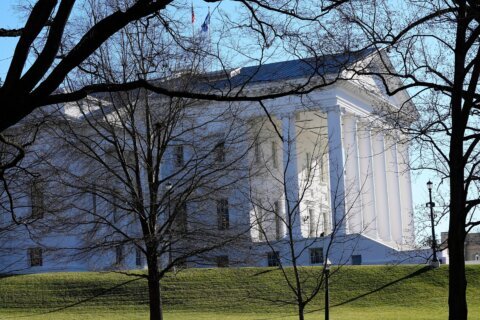WASHINGTON — Virginia Gov. Terry McAuliffe announced the individual restoration of voting rights for thousands of felons on Monday in Richmond.
Notices were mailed last week reinstating the right to vote, serve on a jury and be a notary public for almost 13,000 felons who were stripped of those rights earlier this summer and ordered removed from voter rolls by a Virginia Supreme Court decision.
Standing by the state’s Civil Rights Memorial on Capitol Square, McAuliffe pledged to proactively restore the civil rights of felons who have completed their sentences. And he called on state legislators to change state law, which strips all felons of their civil rights. Only by petitioning the governor can felons regain those rights. Other states restore civil rights automatically.
“I personally believe in the power of second chances and in the dignity and worth of every single human being,” McAuliffe said. “I am not content to condemn them for eternity as inferior, second class citizens.”
McAuliffe called rights restoration the most pressing civil rights issue in Virginia today.
“Virginia’s felon disenfranchisement policy is rooted in a tragic history of voter suppression and marginalization of minorities and need to be overturned,” the governor said in a memo to election officials, prosecutors and legislators.
The move addresses the thousands of felons who had registered to vote after the governor announced a blanket rights restoration for 206,000 felons in April.
State Republican lawmakers sued to block the large-scale reinstatement arguing that the state’s constitution does not give governors the authority to grant clemency en masse to convicted criminals. The Virginia Supreme Court agreed with the lawmakers and ordered the names of the felons who had registered to vote to be removed from voter rolls and reaffirmed the traditional practice for governors to restore civil rights on a case-by-case basis.
Recent administrations have take steps to streamline and standardize the process in order to create a more fair and faster evaluation system. The pace of restorations has quickened under McAuliffe, but he said he felt he was addressing just a fraction of all those offenders eligible.
The new process McAuliffe outlined will comply with the court’s order, he said. But it would also further his own goal to make whole citizens of offenders who have long since returned to their community to raise children, work and pay taxes by lowering the bar for reinstatement and making restoration available to a much wider group of ex-offenders.
Despite McAuliffe’s calls to automate the process, the state’s top legislative leaders, both Republicans, suggested that individual review is the best way to extend civil rights back to offenders.
“Had the governor followed the Constitution of Virginia on April 22 when he initially attempted this, those affected by today’s announcement might not have endured the roller-coaster of bureaucratic incompetence his executive overreach exposed,” a statement from Senate Majority Leader Tommy Norment reads.
House Speaker Bill Howell also criticized the new process McAuliffe laid out, which does not differentiate between violent and nonviolent offenders as past governors have done.
“Undoubtedly, the governor has restored the rights of some deserving citizens. But, there is also no doubt that he has restored the rights of some odious criminals. The people of full Virginia deserve a full explanation of the policy,” Howell said in a written statement.
The initial list of felons restored by an executive order in the spring was found to include sex offenders who have served their sentences but continue to be housed at a state-run, secure facility in Nottoway County. Others were serving time in other states.
McAuliffe acknowledged the errors contained on the list and warned similar problems could arise in the future, calling the expanded review process a “massive administrative undertaking.” But he said such “challenges” wouldn’t stop him or his administration from restoring the rights of other eligible Virginians.
WTOP’s Megan Cloherty contributed to this report from Richmond.







